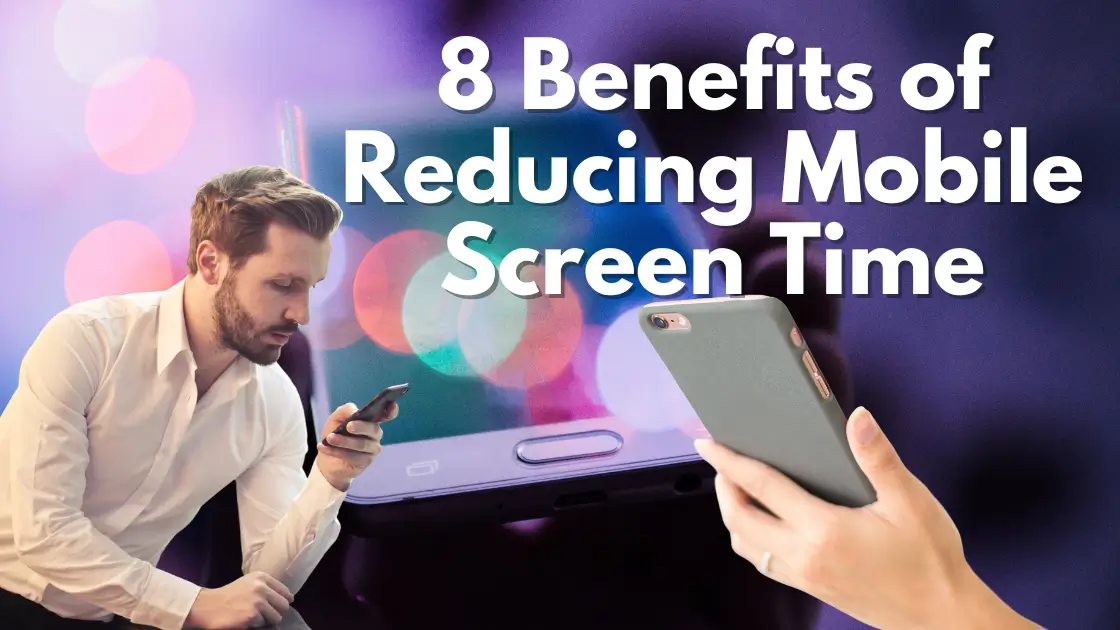Hi there, friends in the tech community! I understand how difficult it may be to pull ourselves away from those bright screens because I am a confessed tech geek. But allow me to tell you about the amazing advantages of cutting back on your mobile screen time. Your physical and emotional well-being will appreciate it, I assure you! There are 8 benefits of reducing mobile screen time that you might find intriguing.
Eight benefits:
1. Better-Quality Sleep

Blue light exposure from screens, such as those on computers, tablets, and smartphones, may disturb your body’s normal sleep-wake cycle, making it more difficult for you to fall asleep. This condition arises from the suppression of melatonin production by blue light, a hormone that controls sleep. Consequently, using a screen right before bed might lower the quality of your sleep and make it more difficult to get a good night’s sleep. You can lessen sleep schedule interruptions and have more restful sleep by cutting back on screen use, especially in the hours before bed. This change encourages improved sleeping practices, which improve general health and raise attentiveness levels during the day. Accepting this shift encourages feelings of calm and relaxation, which in turn encourages a more peaceful, dream-filled sleep.
2. A decrease in tension and worry

Excessive internet consumption frequently produces a stressful atmosphere for a number of reasons, such as social media drama, job pressure, and news updates. People may get overwhelmed by this constant tension and experience mental health issues. On the other hand, cutting back on your screen time allows you to take a mental vacation and detach from these stresses. People can emphasize self-care, regain perspective, and revitalize their minds by removing devices from their lives. By encouraging balance and emotional resilience, this approach promotes a positive interaction between people and technology. People can regain control over their mental health and lead more contented and peaceful lives by giving up using screens.
3. Increased Productivity and Focus

In any event, a lot of people—including myself—have had trouble focusing because of incessant notifications and the attraction of other apps. Cutting down on screen time improves both your productivity and attention span. Technology aficionados frequently aim to quickly finish activities without being distracted by electronic devices. Reducing screen time and minimizing distractions helps people focus, optimize their workflow, and become more effective at work and in their personal lives. By using this strategy, people can have a better, more harmonious relationship with technology, where gadgets serve as tools rather than as continual sources of disruption. This is in line with maximizing technology’s advantages while limiting its negative effects on output and general well-being.
4. Stronger Relationships

There’s no doubting that smartphones may destabilize and harm relationships. Excessive screen usage can create a barrier to important face-to-face encounters, preventing you from making and establishing true connections. Individuals can, however, make room for more honest and rewarding connections by actively limiting their screen time. This change promotes deeper involvement with loved ones, fostering meaningful conversations and quality time together. Individuals may fully focus on others around them without notifications continually distracting them, which strengthens ties and fosters emotional intimacy. Individuals who prioritize real-world interactions above digital distractions can form more rewarding and long-lasting relationships with family and friends. It’s an option that allows people to regain control of their social life and form stronger connections in an increasingly digital environment.
5. Increased physical activity.

If you want to immerse yourself in the world of technology, you need to break out of your digital cocoon and start moving. Reducing screen time allows for a wider range of physical activities, including: gym training, sports, and time outdoors. These workouts have benefits for both physical and mental health. Physical activity reduces stress, improves mood, and promotes health. Avoiding sedentary and screen-based activities may also reduce the risk of obesity and cardiovascular disease caused by prolonged sitting. By increasing physical activity, tech enthusiasts can find a healthy balance between screen time and real-world activities, leading to more meaningful and vibrant lives.
6. Developed self-awareness.

As an AI, I don’t have any personal experience or feelings, but I can certainly understand how it feels to be attacked by digital distractions. In fact, limiting screen time can encourage introspection by making people more aware of their thoughts, feelings, and actions. Stepping away from screens allows for introspection and awareness, which are important aspects of self-development. Without constant digital stimulation, people can better connect with their inner selves, evaluate their values and priorities, and develop a deeper awareness of themselves. This practice promotes self-awareness, which is the basis for positive change and achieving self-development goals. By balancing screen time, individuals can begin a path of self-discovery and fulfillment, laying the foundation for a more meaningful and authentic life.
7. Unleash creativity.

absolutely! Unleashing your creative talents often requires saying goodbye to digital screens. Reducing screen time frees up valuable space for writing, drawing, and creating music. These pursuits not only stimulate the imagination, but also provide opportunities for self-expression and innovation. When you’re disconnected from your digital devices, you can let your mind wander, explore new ideas, and tap into your own creativity. You never know what great ideas you might come up with when you have the opportunity to fully immerse yourself in your creative endeavors without the distractions of a screen. Embracing this break with technology opens the door to endless possibilities and the potential for breakthrough innovations that enrich both your life and the world around you.
8. Increased mindfulness.

Reducing screen time is like hitting the refresh button in your head, allowing you to focus on the present moment. Increased awareness of your surroundings reduces stress, improves concentration, and increases overall well-being. When you step away from digital distractions, you can fully immerse yourself in the present moment and enjoy the beauty and complexity of your surroundings. This thoughtful technology allows you to escape the constant noise of technology and experience peace in the present moment. Practicing mindfulness in every moment strengthens your connection to yourself and the world around you, leading to a more balanced and fulfilling life. Take a vacation from screens and use this time as a path to inner calm.
Tips to Reduce Your Mobile Screen Time:
Now that you understand the benefits, let’s tackle the difficulty of actually minimizing screen time. Here are some practical tips to help you:
1. Track Your Screen Time
Tracking your screen time is a valuable way to understand your digital habits and make informed usage decisions. Most smartphones come with built-in screen time tracking that provides detailed reports on how much time you spend on various apps and activities. Alternatively, you can use third-party apps that offer more extensive analysis and customizable settings.
By regularly monitoring screen time, you can identify usage patterns such as excessive social media scrolling, long gaming sessions, and frequent use of apps at certain times. This information can help you understand where your time is being spent and help you set realistic goals to reduce screen time in areas that may take up most of your day. Once patterns are identified, you can take proactive steps to reduce unnecessary screen time, such as setting app usage limits, scheduling breaks, or finding alternative activities. Tracking your screen time promotes mindfulness and helps you find a healthier balance between your digital and real-world experiences.
2. Set realistic goals.
Setting realistic goals is a key element in effectively managing and reducing screen time. When setting goals, it’s important to consider your current habits, lifestyle, and efforts to ensure they are achievable and sustainable. Rather than imposing drastic limits, start with gradual, realistic goals tailored to your specific needs and circumstances.
For example, you can start by identifying specific activities or periods of time you want to reduce screen time. Aim to slightly reduce your daily or weekly usage, taking into account work, social, and personal commitments. This approach makes customization more manageable and increases the chance of success.
Creating a step-by-step plan can also be helpful. Break down your big goals into smaller, more achievable milestones, and celebrate your progress along the way. Reevaluate your goals regularly and adapt to changing priorities and circumstances. By setting realistic and achievable goals, you can foster a positive attitude, stay motivated, and make gradual but lasting changes to your digital habits.
3. Create a schedule.
Setting a clear schedule for your phone usage is an effective strategy to regain your digital habits and improve your productivity. Start by identifying specific times of the day when using your phone is most appropriate and aligns with your priorities. Set aside time to focus on work, communication, and leisure to ensure a healthy balance.
Consider setting aside a specific time to check and respond to emails, social media, and other non-essential activities. Setting clear boundaries prevents aimless scrolling and minimizes the risk of distraction from important tasks. Additionally, scheduling phone breaks at regular intervals allows you to consciously relax and not be dominated by your phone throughout the day.
Use alarms or notifications as reminders to improve schedule adherence. Gradually incorporate these scheduled phone times into your daily life until it becomes a habit. A structured schedule not only helps you make sure you get important tasks done, but it also promotes a healthier relationship with your devices and encourages more mindful and intentional use of screen time.
4. Turn off notifications.
Turning off notifications for non-essential apps is an effective strategy to regain focus and reduce distractions. Notifications often distract us from important tasks and cause constant interruptions. Selectively turning off notifications gives you control over when and how you interact with your device.
First, identify which apps are essential for receiving real-time notifications and which apps can be checked at any given time. Go to your device settings and selectively turn off notifications for non-essential apps. This simple action will help you create a more conscious and focused digital environment.
Turning off notifications not only minimizes interruptions but also promotes a sense of autonomy over time. This allows you to decide when to interact with the app without having to respond to constant alerts. This habit improves your focus, productivity, and overall sense of well-being by allowing you to focus your attention on the tasks that really matter without unnecessary interruptions. Your attention will be appreciated as you create a more mindful and managed digital experience.
5. Use grayscale mode.
Enabling grayscale mode on your phone is a subtle but effective technique that reduces the visual appeal of your screen and potentially curbs the temptation to spend too much time on your device. Grayscale eliminates bright colors from the display, creating a more monotonous and visually unstimulating environment.
This intentional desaturation can make apps, images, and content look less appealing, making the overall screen less appealing. As a result, visual stimulation is reduced, and unnecessary usage is avoided, especially during activities such as browsing social media or playing games.
To enable grayscale mode, go to your device’s settings, find accessibility options, and look for display settings. When you enable grayscale mode, your screen instantly changes to gently remind you to use your device more carefully.
While it may not be a complete solution, incorporating grayscale mode into your digital detox efforts is a practical and unobtrusive way to reduce the visual appeal of your phone, thereby reducing the screen’s Promote a healthier balance between screen time and the real world.
6. Take breaks.
In order to maintain your physical and mental health, it’s important to incorporate phone breaks into your daily routine. Constant exposure to screens can strain your eyes and cause fatigue and mental fatigue. Taking a conscious break gives your eyes the chance to rest they need and recharges your mind.
Plan short breaks throughout the day to step away from your phone and participate in relaxing activities. Whether you stretch, take a walk, take some deep breaths, or simply look away from your screen, these breaks can significantly reduce eye strain and improve your overall concentration. Additionally, breaks can serve as valuable reminders to evaluate your screen habits and make sure you’re finding a healthy balance. Setting specific break intervals can help you avoid long periods of uninterrupted phone use and encourage more careful use of technology.
Incorporating regular breaks into your routine creates space for regeneration and focus, allowing your eyes and brain to enjoy a much-needed break from daily digital demands.
7. Engage in other activities.
Exploring activities that don’t require the use of your phone is an important aspect of maintaining a balanced and fulfilling lifestyle. Engaging in hobbies and activities outside of offline time not only reduces screen time but also contributes to a more balanced and fulfilling daily experience.
Consider activities that align with your interests and give you satisfaction. Reading books, exercising, pursuing creative hobbies, and spending quality time with loved ones are all excellent options. These activities not only provide a break from screen stimulation but also have a positive impact on your overall health. By diversifying your interests, you can create a more meaningful and purposeful life beyond the digital world. This not only reduces dependence on mobile phones but also promotes a sense of accomplishment and fulfillment in activities that bring joy and satisfaction. A variety of offline activities contribute to a healthier lifestyle and promote mental, emotional, and physical health.
8. Create phone-free zones.
Creating a no-phone zone in a specific area of your home or workplace is a strategic way to intentionally create a space where you can relax and focus on the present moment. Designating specific areas where phone use is restricted strengthens the boundaries between the digital and physical realms and promotes a healthier balance in your daily life.
For example, consider making your bedroom a phone-free zone to improve sleep hygiene. This will improve your sleep quality by reducing nighttime scrolling and the temptation to look at your phone as soon as you wake up.
In professional environments, set up conference rooms or common areas as phone-free zones to foster focused collaboration and minimize distractions during important discussions. By intentionally creating these designated spaces, you can create environments that support conscious and purposeful interactions, both at home and at work. This not only reduces unnecessary screen time but also improves the quality of real-world interactions and experiences.
I hope these strategies and benefits encourage you to begin your journey toward minimizing mobile screen time. By implementing practices like setting realistic goals, creating a schedule, and establishing a no-phone zone, individuals can foster a conscious and intentional relationship with their devices. The result is less screen time, improving productivity and focus, as well as opening up opportunities for meaningful practice participation and overall well-being. If we prioritize these changes, our health will improve, and the positive impact will extend beyond our personal well-being and contribute to a healthier social relationship with technology. Believe me, your health will thank you for it!

